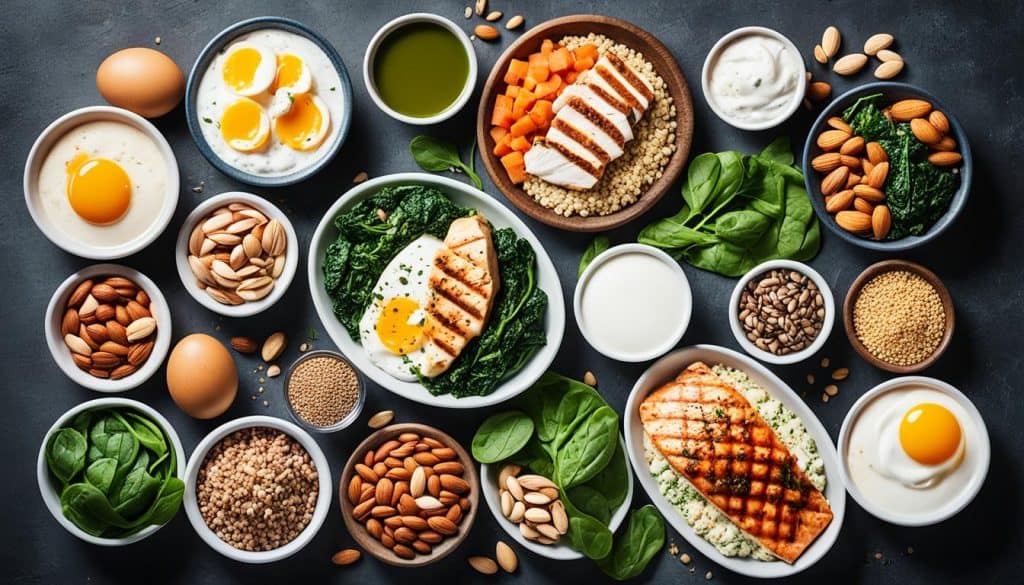
Are you looking to lose 20 pounds and achieve effective weight loss? If so, you’ve come to the right place. In this article, I will share some tips and strategies that can help you reach your weight loss goals in a healthy and sustainable way. By incorporating these tips into your daily routine, you can shed those extra pounds and embrace a healthier lifestyle.
Key Takeaways:
- Create a balanced diet and exercise routine to achieve steady weight loss.
- Set realistic goals and aim to lose 1-2 pounds per week.
- Count calories to track and control your food intake.
- Stay hydrated by drinking plenty of water.
- Increase your protein intake for increased satiety and metabolism.
Is it possible to lose 20 pounds in 30 days?
When it comes to losing weight, many people have ambitious goals and want to see quick results. But is it really possible to shed 20 pounds in just 30 days? Let’s take a closer look.
While it is technically possible to lose 20 pounds in a month, it typically requires extreme measures such as following a very low-calorie diet. This type of diet involves severely restricting your calorie intake, often to less than 800 calories per day. While it may lead to rapid weight loss, it is not the most sustainable method and can pose risks to your health if not done under the guidance of a healthcare professional.
The best approach to weight loss is a slow and steady one. It is recommended to aim for a loss of 1-2 pounds per week. This allows your body to adjust to the changes and ensures that you are losing fat rather than muscle mass. Additionally, losing weight at a moderate pace is more likely to result in sustainable weight loss, where you are able to maintain your new weight in the long term.
Creating a caloric deficit is key to losing weight. This means consuming fewer calories than your body needs for maintenance. It can be achieved through a combination of dietary changes and increased physical activity. By making healthier food choices and incorporating regular exercise into your routine, you can create a sustainable caloric deficit and achieve your weight loss goals.
Remember, sustainable weight loss is not just about reaching a specific number on the scale. It’s about adopting a healthy lifestyle that you can maintain for the long term. Focus on nourishing your body with balanced meals, staying active, and finding enjoyment in the process.
Count calories

Counting calories is an effective way for you to track and control your food intake. By keeping a record of the number of calories you consume, you can gain a better understanding of your calorie intake and make healthier choices. Counting calories can help you increase awareness of portion sizes, avoid overeating, and stick to your weight loss goals.
One helpful tool for counting calories is using a calorie-counting app. These apps provide a comprehensive database of food items and their calorie content, making it easier for you to track your calorie intake throughout the day. Some apps even offer features that allow you to set personalized calorie goals and track your progress.
By counting calories, you can make informed decisions about your meals and snacks, ensuring that you are consuming a balanced diet within your desired calorie range. It allows you to make healthier choices by substituting high-calorie foods with lower-calorie alternatives without sacrificing taste or satisfaction. This method encourages you to prioritize nutrient-dense foods that support your overall health and weight loss efforts.
“Counting calories has been a game-changer for me. It has helped me take control of my eating habits and make better choices. It’s not about depriving myself, but rather being mindful of what I eat and making smarter decisions.”
Keeping track of my calorie intake has empowered me to make conscious decisions about my nutrition and take responsibility for my health. It has given me a clear understanding of the impact of different foods on my calorie balance, allowing me to make adjustments as necessary. Counting calories has become an essential tool in my weight loss journey, helping me stay accountable and motivated towards achieving my goals.
Benefits of counting calories:
- Increases awareness of portion sizes
- Promotes healthier food choices
- Helps in maintaining a balanced diet
- Supports weight loss goals
- Encourages mindfulness in eating habits
Drink more water
When it comes to weight loss goals, one simple but effective strategy is to increase your water intake. Not only does staying hydrated have numerous health benefits, but it can also aid in appetite control and reduce overall calorie consumption.
A study conducted at the University of Birmingham found that drinking water before meals can be more effective in weight loss than simply increasing daily water intake. The researchers discovered that participants who drank water before their meals consumed fewer calories during the meal and experienced greater satiety.
So, how exactly does drinking water help with weight loss? First, it promotes satiety, making you feel fuller and reducing the chances of overeating. Often, we confuse thirst with hunger, leading us to consume unnecessary calories. By staying hydrated, you can alleviate this confusion and better control your appetite.
| Benefits of Increased Water Intake for Weight Loss | |
|---|---|
| 1. Promotes satiety and reduces overeating | |
| 2. Helps control appetite and reduce calorie consumption | |
| 3. Supports overall hydration and optimal bodily functions | |
| 4. May help boost metabolism | |
| 5. Zero calories and a healthier alternative to sugary drinks |
Drinking ample water throughout the day can also support your weight loss goals by keeping you hydrated and facilitating optimal bodily functions. Additionally, water has zero calories, making it a healthier alternative to sugary drinks, which can contribute to weight gain.
Therefore, if you’re looking to shed those extra pounds, make sure to prioritize your water intake. Aim to drink a glass of water before each meal and keep a water bottle with you to stay hydrated throughout the day. Remember, staying hydrated is not only good for your overall health but can also play a significant role in achieving your weight loss goals.
Increase Your Protein Intake

When it comes to weight loss, incorporating protein-rich foods into your diet can have an impactful effect on your journey. Protein not only increases feelings of fullness but also helps boost metabolism, making it an essential component of any weight loss plan.
Protein acts as a powerful macronutrient that alters hormone levels and metabolic processes, aiding in weight loss. By consuming protein-rich foods, you can enhance satiety, preventing overeating and promoting portion control.
Moreover, protein requires more energy to digest compared to carbohydrates and fats, resulting in a greater energy expenditure known as the thermic effect of food. This means that your body burns more calories when metabolizing protein, thus supporting your weight loss goals.
So, what are some protein-rich foods you can incorporate into your diet? Consider adding lean sources such as chicken breast, fish, turkey, tofu, beans, lentils, and Greek yogurt. These foods not only provide an excellent source of protein but also offer various essential nutrients to fuel your body.
To illustrate the benefits of protein-rich foods, consider the following table:
| Protein-Rich Food | Protein Content per Serving |
|---|---|
| Grilled Chicken Breast (3 ounces) | 26 grams |
| Salmon (3 ounces) | 22 grams |
| Tofu (1/2 cup) | 10 grams |
| Black Beans (1/2 cup) | 8 grams |
| Greek Yogurt (1 cup) | 20 grams |
Remember, incorporating protein into your meals and snacks can help you maintain a feeling of fullness while supporting your weight loss efforts. So, make sure to include protein-rich foods as a part of your balanced diet.
Tip: Try adding a serving of protein to each of your meals to increase your overall intake and promote satiety throughout the day.
Reduce your refined carb consumption
When it comes to achieving effective weight loss, reducing refined carb consumption can play a pivotal role. Refined carbohydrates, such as white bread, pasta, and sugary snacks, have undergone extensive processing that strips them of their natural nutrients and fiber content. These processed foods have a high glycemic index, which means they cause a rapid spike in blood sugar levels and subsequent crash, leaving you feeling hungry again soon after.
By opting for lower glycemic index foods and cutting back on refined carbs, you can better control your hunger levels and prevent weight gain. Foods with a lower glycemic index, such as whole grains, fruits, and vegetables, are digested more slowly, resulting in more stable blood sugar levels and a longer-lasting feeling of fullness.
To illustrate the glycemic index values of various carbohydrates, consider the following table:
| Food | Glycemic Index |
|---|---|
| Brown rice | 50 |
| White rice | 73 |
| Banana | 52 |
| White bread | 71 |
| Whole grain bread | 51 |
As you can see, choosing whole grain options like brown rice or whole grain bread, which have lower glycemic index values, can help you feel fuller for longer, prevent blood sugar spikes, and support successful weight loss.
Remember, making healthier choices and reducing refined carb consumption should be part of a well-rounded, balanced diet plan. Emphasize whole foods, incorporate a variety of nutrient-dense fruits and vegetables, and consult with a healthcare professional or registered dietitian for personalized guidance.
I believe that by prioritizing the reduction of refined carb intake, you can take positive steps toward achieving your weight loss goals and enjoy the benefits of a healthier lifestyle.
Start lifting weights

When it comes to achieving your weight loss goals, resistance training should not be overlooked. Incorporating weightlifting and resistance exercises into your fitness routine can help you build lean muscle mass and boost your resting metabolism.
Resistance training involves using weights, resistance bands, or your own body weight to perform exercises that target specific muscles or muscle groups. It applies resistance against the muscles, forcing them to work harder and adapt, leading to strength and muscle gains.
Why is resistance training essential for weight loss?
Unlike cardio exercises that primarily focus on burning calories during the activity, resistance training has a more long-term impact on your weight loss journey. Here’s why:
- Preserve lean muscle mass: When you’re in a calorie deficit, your body can break down muscle tissue for energy instead of burning fat. Incorporating resistance training into your routine can help preserve your existing lean muscle mass while promoting fat loss.
- Increase resting metabolism: Lean muscle mass requires more energy to maintain than fat. By increasing your muscle mass through resistance training, you can boost your resting metabolism, which means you’ll burn more calories at rest throughout the day.
- Shape your physique: Weightlifting and resistance exercises can help sculpt and define your muscles, improving your overall body composition. This can give you a more toned and lean appearance as you continue to lose weight.
While resistance training is highly beneficial for weight loss, it’s important to approach it with the right knowledge and guidance. Consulting with a healthcare professional or a certified personal trainer can help you create a safe and effective exercise plan tailored to your fitness level and goals.
Sample Resistance Training Plan
Here’s a sample resistance training plan to get you started:
| Exercise | Sets | Reps |
|---|---|---|
| Barbell Squats | 3 | 10-12 |
| Dumbbell Bench Press | 3 | 10-12 |
| Deadlifts | 3 | 8-10 |
| Seated Cable Rows | 3 | 10-12 |
| Overhead Press | 3 | 10-12 |
Remember to start with a weight that challenges you but allows you to maintain proper form. Gradually increase the weight and intensity as you become stronger.
Incorporating resistance training into your weight loss journey can help you achieve better results and improve your overall fitness level. Combine it with cardiovascular exercises, a balanced diet, and proper rest for a comprehensive approach to your health and wellness goals.
Eat more fiber
When it comes to aiding weight loss efforts and promoting overall gut health, consuming dietary fiber, especially soluble fiber, is key. Soluble fiber is a type of fiber that dissolves in water to form a gel-like substance in the digestive tract. This gel helps slow down the digestion process and improves feelings of fullness, making you feel satisfied and less likely to overeat.
In addition to promoting feelings of fullness, soluble fiber also has numerous benefits for gut health. It acts as a prebiotic, providing nourishment for the beneficial bacteria in your gut. These bacteria play a crucial role in maintaining a healthy gut microbiome, which is important for digestion, immune function, and overall well-being.
So, where can you find soluble fiber? Some excellent sources include:
- Legumes such as chickpeas, lentils, and black beans
- Oats and oat bran
- Fruits like apples, oranges, and berries
- Vegetables such as carrots, broccoli, and Brussels sprouts
By incorporating these fiber-rich foods into your diet, you can increase your soluble fiber intake and reap the benefits of improved feelings of fullness and better gut health.
| Fiber-Rich Foods | Soluble Fiber Content per 100g |
|---|---|
| Chickpeas | 3.7g |
| Lentils | 4g |
| Black beans | 4.8g |
| Oats | 1.7g |
| Oat bran | 5.5g |
| Apples | 2.4g |
| Oranges | 2.4g |
| Berries | 2-3g |
| Carrots | 2.8g |
| Broccoli | 2.2g |
| Brussels sprouts | 2.6g |
Follow a Sleep Schedule
Getting enough sleep and improving sleep quality are vital for overall well-being and can have a significant impact on weight loss. Adequate sleep supports weight management by preventing obesity and enhancing energy levels. To optimize your sleep routine, it is crucial to establish a regular sleep schedule and practice good sleep hygiene.
What is Sleep Hygiene?
Sleep hygiene refers to habits and practices that promote healthy sleep. By incorporating these habits into your daily routine, you can improve both the quantity and quality of your sleep. Here are some essential sleep hygiene practices:
- Stick to a consistent sleep schedule, going to bed and waking up at the same time every day, even on weekends.
- Create a relaxing bedtime routine to signal to your body that it’s time to sleep. This could include activities like reading, taking a warm bath, or practicing relaxation exercises.
- Create a conducive sleep environment by ensuring your bedroom is dark, quiet, and at a comfortable temperature.
- Avoid stimulants such as caffeine and nicotine close to bedtime, as they can interfere with sleep.
- Avoid heavy meals and exercise right before bedtime, as they can disrupt sleep.
- Avoid electronics, including smartphones, tablets, and televisions, for at least an hour before bed. The blue light emitted by these devices can interfere with your sleep-wake cycle.
By incorporating these sleep hygiene practices into your daily routine, you can promote better sleep and improve your overall energy levels.
Remember, a consistent sleep schedule and good sleep hygiene can greatly benefit your weight loss journey. Prioritizing quality sleep will set you up for success in achieving your weight loss goals.
| Sleep Benefits | Weight Loss Benefits |
|---|---|
| Improved cognitive function | Increased energy levels |
| Enhanced mood and emotional well-being | Prevention of obesity |
| Boosted immune system | Raised metabolism |
| Reduced risk of chronic diseases | Better appetite regulation |
Add Cardio to Your Routine
When it comes to weight loss, incorporating cardio exercise into your routine is essential. Cardiovascular exercise, also known as aerobic exercise, not only helps you burn calories but also improves your overall health, strengthens your heart and lungs, and boosts your energy levels.
To maximize the calorie burn and promote weight loss, it is recommended to engage in at least 150 minutes of moderate-intensity aerobic exercise each week. This can be achieved through activities such as brisk walking, jogging, cycling, swimming, or dancing.
Cardio workouts increase your heart rate and breathing, stimulating the body to use stored fat as fuel. As a result, regular aerobic exercise helps shed excess weight and maintain a healthy body composition.
In addition to its impact on weight loss, cardio exercise offers numerous other health benefits. It can improve cardiovascular fitness, reduce the risk of chronic diseases, enhance mental well-being, and boost overall endurance.
| Benefits of Adding Cardio to Your Routine | Examples of Cardio Exercises |
|---|---|
| Increases calorie burn | Brisk walking, jogging, cycling |
| Strengthens the heart and lungs | Swimming, dancing, rowing |
| Improves cardiovascular fitness | HIIT workouts, aerobics, kickboxing |
| Reduces the risk of chronic diseases | Treadmill running, elliptical training |
| Enhances mental well-being | Zumba, jump rope, stair climbing |
| Increases endurance | Cross-country skiing, mountain biking |
Remember to choose aerobic exercises that you enjoy, as this will help you stay motivated and make your workouts more enjoyable. Varying your cardio routine and gradually increasing the intensity can also help prevent boredom and plateauing.
However, if you have any underlying health conditions or concerns, it’s important to consult with a healthcare professional before starting a new exercise program. They can provide personalized guidance and ensure that you engage in safe and effective workouts.
Conclusion
Losing 20 pounds is achievable by setting realistic weight loss goals, embracing a healthy lifestyle, and making sustainable changes. It is important to remember that weight loss is not a quick fix but rather a journey that requires patience and dedication.
To reach your weight loss goals, focus on incorporating a balanced and nutritious diet. Counting calories can help track your food intake and make healthier choices. Additionally, increasing water intake can promote feelings of fullness, while consuming more protein-rich foods can boost metabolism and satiety.
Don’t forget the importance of regular exercise. Incorporating aerobic workouts and resistance training can help burn calories, preserve lean muscle mass, and strengthen your body. Remember, adopting a healthy lifestyle is the key to sustainable weight loss.
FAQ
Is it possible to lose 20 pounds in 30 days?
Losing 20 pounds in a month is neither safe nor sustainable. It is recommended to aim for a steady weight loss of 1-2 pounds per week. Creating a caloric deficit through a balanced diet and regular exercise is the key to successful weight loss. While it is possible to lose 20 pounds in a month with a very low-calorie diet, it is not the most sustainable method and should only be attempted under the guidance of a healthcare professional.
How can I count calories?
Counting calories can be an effective way to track and control your food intake. It helps increase awareness of portion sizes and promotes healthier choices. Using a calorie-counting app can be helpful in keeping track of calorie intake and food choices.
How does drinking more water help with weight loss?
Increasing water intake can help with weight loss by promoting satiety and reducing overall calorie consumption. Drinking water before meals has been shown to be more effective in weight loss than simply increasing daily water intake.
How does increasing protein intake aid in weight loss?
Including more protein-rich foods in your diet can help with weight loss by increasing feelings of fullness and boosting metabolism. Protein alters hormone levels and metabolic processes, contributing to weight loss.
Why should I reduce my refined carb consumption?
Refined carbohydrates can lead to increased hunger levels and weight gain. Choosing lower glycemic index foods and reducing refined carb consumption has been associated with effective weight loss.
How does resistance training contribute to weight loss?
Resistance training helps preserve lean muscle mass and increases resting metabolism. It is recommended to consult with a healthcare professional or personal trainer before starting a new exercise routine.
Why is dietary fiber important for weight loss?
Consuming dietary fiber, especially soluble fiber, can promote feelings of fullness, improve gut health, and aid weight loss efforts.
How does sleep affect weight loss?
Getting enough sleep and improving sleep quality can support weight loss by preventing obesity and enhancing energy levels. Establishing a regular sleep schedule and implementing good sleep hygiene practices are recommended.
Why should I include cardio in my exercise routine?
Cardiovascular exercise, such as aerobic workouts, can improve overall health and aid in weight loss by increasing calorie burn and strengthening the heart and lungs. It is recommended to engage in at least 150 minutes of moderate exercise per week.
How can I achieve sustainable weight loss?
Losing 20 pounds is achievable with the right combination of a healthy diet, regular exercise, and lifestyle changes. It is important to set realistic goals, prioritize overall health, and adopt sustainable habits for long-term success. Remember, losing weight is a journey that requires patience and dedication.
Hey there, I’m Luke, and I’ve been immersed in the fitness world since 2007. From gym floors to running my own personal training business, I’ve seen it all. My journey led me to study Sports Science at university, where I deepened my understanding of the science behind exercise.
One thing that truly lights my fire? High-Intensity Interval Training (HIIT). It’s not just a workout; it’s a game-changer. I’ve used HIIT to help countless men and women shed weight and transform their lives for the better.
Through my personal training business, I’ve witnessed the incredible impact of HIIT on both physical and mental well-being. It’s not just about getting fitter; it’s about feeling stronger, more confident, and more resilient.
Join me on this journey to a healthier, happier you. Let’s crush those goals together!

